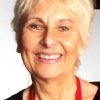Speaking up: why Tara Diversi wants dietitians to have a louder voice
 Paula Goodyer
Paula Goodyer
By the time her term as President of the Dietitians Association ends in November, Tara Diversi hopes she’ll have encouraged dietitians to become a louder voice for their profession.
“We make a huge difference yet we’re often seen as the support act, not the hero. We need to stand up for what we know,” says Diversi, pointing to mental health as a shining example of where APDs deserve more recognition. “Given the evidence for the influence of nutrition on mental health and that people with mental health problems are vulnerable to poor nutrition, it’s time for dietitians to be recognised as mental health practitioners.
“If someone has a mental health problem the rebate for a session with a psychologist through a mental health care plan is around $90 to $100 but to see a dietitian the rebate is only $55 because sessions with dietitians are still not available under a mental health care plan.” Tara points out.
A recommendation that APDs be included in the definition of mental health practitioners is one of many recommendations to the government to improve access to dietitians included in the DA’s Pre-Budget Submission this year.
“People with mental health problems can’t advocate for themselves - we need to advocate for them so a GP can refer them to a dietitian through a mental health care plan,” she says.
Besides being part of a professional organisation that’s lobbying for change, she also encourages dietitians to advocate for causes as individuals.
“If you see something that needs to change, then do something. You don’t need to be a special person or have a certain intellect to make a difference. If you’re passionate about an issue, look for opportunities to put your hand up and join a board or a committee that might make a difference.”
Like the DA itself, she also has a special interest in Aboriginal and Torres Strait Islander nutrition which stems from growing up in Kununurra, the West Australian town on the edge of the Kimberley with a mainly Indigenous population.
“The only way to improve nutrition in Indigenous communities is to have more Aboriginal and Torres Strait Islander dietitians in the workforce. Yet the number of Aboriginal and Torres Strait Islander dietitians is embarrassingly low - of around 7,000 APDs in Australia, less than 50 are of Aboriginal or Torres Strait Islander background.There aren’t enough regional dietetics courses for one thing - there are none in Cairns, Darwin or anywhere else in the Northern Territory,” says Tara who’s based in Cairns herself.
As an APD, Tara is co-founder of Sophus Nutrition which provides nutrition programs delivered via an app and, as a sports dietitian, consults to long distance swimmers and ice swimmers. These are endurance sports she knows well, having swum 33 kilometres across the English Channel in 2012 and in 2019 became the first Australian woman to complete a 1.6 kilometre swim in icy waters under 5 degrees C - without a wet suit.
“Endurance swimming becomes very addictive - once I’d touched land in France after the Channel swim, all the pain went away and I couldn’t wait to do the next one. But the ice swim was the most challenging and achieving that meant more than the Channel swim - although it’s not something I recommend.”
How do you develop the mental toughness to cope with an ice swim?
“To do something big you have to realise that you have to make sacrifices. I couldn’t have done this if I didn’t have the time to train and focus 100 per cent on the challenge - if I were starting my business, or had a new baby, for example.
“I break down challenges into components and tackle each component individually. For the ice swim it was the cold, speed in the pool and managing physiological responses with breathing training and mental training like meditation and dissociation.
“Extreme sports are not for everyone but I hope my swim inspires people to do something they want to do too, whatever that may be.”